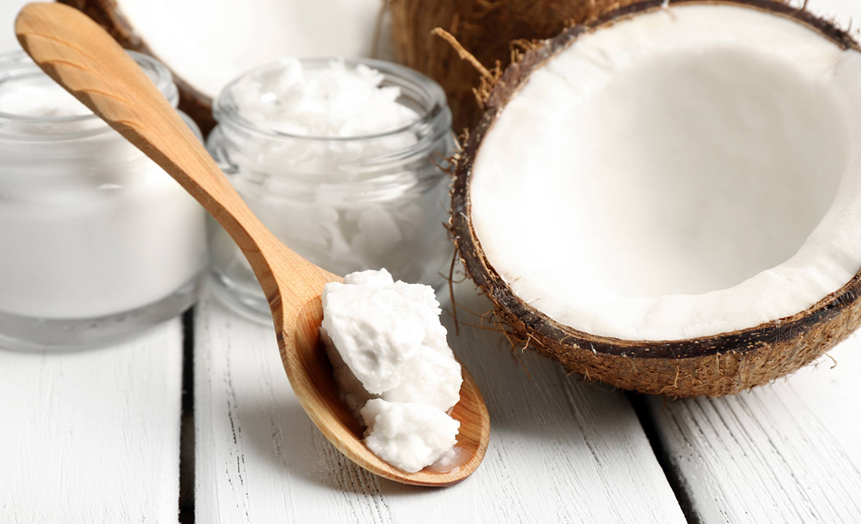The Health Benefits of Coconut Oil
From Madagascar to Sri Lanka, Central America to the Austronesian islands, humans have long prized the coconut for both its nutritional and practical value. But aside from serving as a tasty source of fruit, potable liquid, and practical coir, oil from the nut of the coconut palm — Cocos nucifera — also offers a number of health and nutritional benefits.
What Sets Coconut Oil Apart?
In recent years, coconut oil has been heralded as a superfood, thanks its many uses and benefits. Not only do coconuts provide nutrients such as protein, fiber, vitamins A, B, D, E and K, and minerals such as calcium, copper, magnesium, and potassium, their oil serves as a rich source of lauric acid, a type of healthy saturated fatty acid.
The type of saturated fat found in coconut oil has been linked to a number of physical benefits, including heart health, lowered LDL (or “bad”) cholesterol, improved cognitive and brain function, decreased inflammation, and even a reduction in waist size. “But wait,” you might be thinking, “I thought saturated fats were supposed to be unhealthy!”
For many years, conventional wisdom told us that all saturated fats were unhealthy…that they caused weight gain, metabolic syndrome, heart problems, and other health issues. But scientific studies indicate that the type of saturated fat found in coconut oil doesn’t contribute to these health problems; in fact, it actually may contribute to health, cognitive, and overall health.
So what sets coconut oil apart from other fats? The difference lies in a component called medium-chain triglycerides, or MCTs. The fat in coconut oil is rich in MCTs; in contrast, other saturated fats — such as those found in animal products, soybean oil, and partially hydrogenated fats found in highly processed and junk foods — contain long-chain triglycerides, or LCTs.
MCTs have a very different chemical structure than LCTs. When you ingest MCTs, your body digests them quickly and easily, converting them into energy rather than storing them as fat. LCTs, on the other hand, take longer to convert to energy, and tend to stick around in the bloodstream, eventually converting into body fat.
Coconut Oil: A True Superfood
But it’s not just the MCTs that make coconut oil so beneficial. The lauric acid in coconut oil has been shown to have anti-inflammatory and anti-microbial properties, making it an effective topical treatment for acne. Some studies also indicate that coconut oil is a rich source of anti-oxidants that may reduce inflammation associated with arthritis. In addition, the oil promotes heart health by boosting HDL, or “good” cholesterol, while reducing LDL, or “bad” cholesterol.
Studies also indicate that coconut oil may help protect neurons, offering a boost to brain function and offering benefits to those suffering from Alzheimer’s or Parkinson’s disease.
It’s easy to add coconut oil to your diet; use it instead of lard or margarine when you’re baking or cooking, throw a teaspoon into a smoothie or a bowl of granola, add it to your popcorn instead of butter, or roast some veggies in coconut oil, lemon juice, and thyme for a healthy side.
But with all the different brands and types of coconut oil available, which kind offers the most health and nutritional benefits?
Researchers suggest avoiding conventional coconut oil; often used in candy and coffee creamer, this type of oil comes from dried, bleached, and chemically treated coconut. It’s highly processed, and simply doesn’t offer the same healthy benefits.
Instead, look for coconut oil that’s labeled as virgin, extra-virgin, expeller-pressed, or cold-pressed. These types of oil is made from fresh coconut meat that’s undergone a gentler extraction process and retains more nutrients and lauric acid. Adding this superfood to your diet is a smart way to boost heart health, protect brain function, and even reduce waist size.
XOXO Tina
Sources:
https://www.washingtonpost.com/news/to-your-health/wp/2014/05/29/why-all-the-fuss-about-coconut/
http://www.health.harvard.edu/staying-healthy/coconut-oil
http://health.usf.edu/byrd/~/media/Files/Byrd%20Alzheimers%20Institute/BRDWinter2013web.pdf
http://www.cspinet.org/nah/articles/coconut-oil.html
http://www.cspinet.org/nah/articles/coconut-oil.html
http://www.mayoclinic.org/coconut-oil-and-weight-loss/expert-answers/faq-20058081
http://www.clevelandclinicwellness.com/Features/Pages/MediumChainTriglycerides.aspx
http://www.ncbi.nlm.nih.gov/pubmed/24150106





